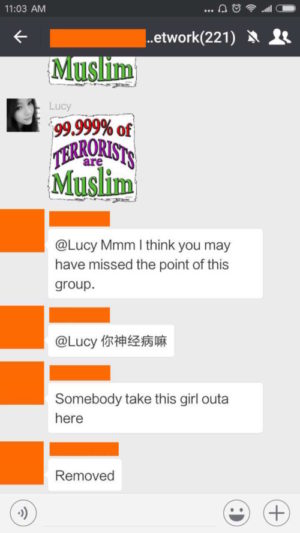Moderator: “Maybe in other groups that hate is acceptable, but here we don’t have to listen to your spewing.”
Member: “Fine.”
I could feel the tension as the whole group paused and waited for what either the moderator or the member would do.
The silence broke when another member said, “Oh my gosh, he quit! Yes!”
This was the most extreme of WeChat conflicts I had seen, but by far it wasn’t the only rude behavior passing through screens and cyberspace.

This kind of hate is not OK
As WeChat has matured, there is a certain amount of etiquette that’s expected, but groups are hard spaces to control. It’s easier to control Moments from a personal perspective, since if others don’t like what a user posts, they can block or complain, and the user will never know.
But groups that reach 100 members or more, and to the max of 500 members, can get out of control quickly and lose their usefulness. So we asked anonymous moderators of all sorts of backgrounds with all kinds of groups what annoys them most and what will get people kicked from groups. We decided to keep their names anonymous to avoid the moderators receiving any sort of backlash.
Breaking Rules
One moderator, Allison Brown* with five 100- to 500-member groups told us, “I run several types of groups, two that are very low key, two that are mildly strict (no stickers), but another that’s very strict with only one type of content allowed. I try to let the rules be formed by the group participants, so there’s buy-in and everyone has agreed.”
Of breaking rules, her number one pet peeve, Brown said, “I have a zero tolerance rule in one group for people who break the rules because they’ve signed on to the rules. After the first couple of times of kicking someone out for good reason, no one broke the rules anymore unless they were new.”
But in the other groups, moderation is easier. “In my free-flow group, the only rule is to keep on topic, and that group self-regulates. It’s only annoying when someone has a full-blown private conversation in the group. All it takes is saying ‘take it to another chat’ for the conversation to move though. I haven’t had to kick anyone out of low key groups or my other semi-strict groups, though a few people have quit from one group when they were shamed by the whole group for spamming.”
Spam a Common Complaint
Another moderator, Reese Jackson* said, “The members in my WeChat groups usually act very politely towards each other and are very helpful when asked about certain topics or issues. They are all in these groups together for a common purpose so it’s advantageous for everyone if we are kind and respectful.” His irritation was similar to Break’s. “The things that people do that tend to irritate me in my groups is when they post non-relevant ads or begin off topic conversations,” Jackson said.
Henry Stewart* said spam, or “anything irrelevant to the group purpose,” and “shameless promoting of product and one’s own services” along with “constantly changing subject” really annoyed him, but he admitted the last one was difficult.
Sarah Gillespie* has a problem with people in her group getting irritated with her when she asks them to comply by the rules. She also doesn’t like when others invite new people who don’t really belong in the group. “One man was invited to our group, but he didn’t have kids. Another guy waned to be added to a breastfeeding group. When I asked him about it, he responded, ‘I don’t have to explain myself, just delete me.’”
“You know the beauty of it all. Every time there is a discussion on the group and people complain about the rules or whatever they don’t agree with, another member will private message me to thank me for coordinating and moderating.”
“Besides that, there isn’t much. I know a lot of the members personally, so not much harassment happens in my group, like strangers adding you to practice English,” Gillespie said.

When asked if she ever sees any parent or mommy bashing, she admitted the group she manages has gotten fierce. Cultural differences tend to be the culprit, Gillespie explained during a situation when circumcision came into discussion, “It became a bit of America-bashing, and the pro circumcision moms didn’t dare to speak up (I felt) so it was a bit of one sided discussion, alas.” She added, “I always encourage both sides to speak up though.”
Manners Matter
Surprisingly, the last group moderator we talked to, Carry Net*, didn’t have as much of an issue with spam or rules, but with how members were treating one another.
Net was most peeved by people making use of a group to shame someone else. After this, she listed, “When people ask me to remove someone but for a conversation or opinion, because there needs to be a healthy diversity of opinions… When people don’t read the whole conversation and jump in. Especially when people start with, ‘I haven’t read this but.’”
We loved Net’s comments because she reminded us that rules or no rules, spam or no spam, WeChat is meant to be a place of community, where we connect and share. Offending group members should remember that both moderators and other group members pay attention to those who break rules or hurt others, and that impression may have a longer lasting impact than on forums, where anonymity is a given. WeChat is typically connected to life, with bosses and coworkers, teachers, and neighbors involved in many of the groups frequented.
*All names changed.
Photo: Andy Penafuerte III

More stories by this author here.
Email: vanessajencks@truerun.com
Twitter: @vanessa_jencks
WeChat: vanessajencks





1 Comment
Technode just published an article about the features Wechat needs to implement to allow for better group management : http://technode.com/2017/10/10/sos-tencent-we-need-these-wechat-group-features-2/